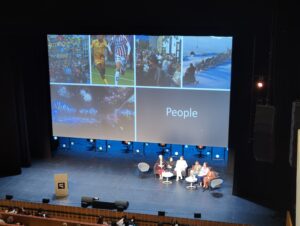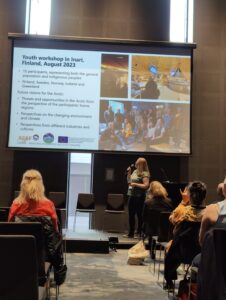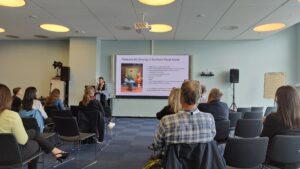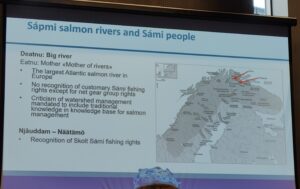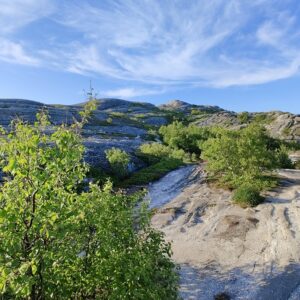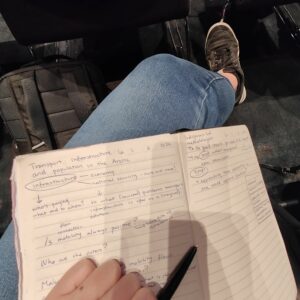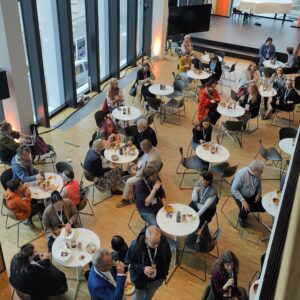The Arctic Congress 2024 in Bodø felt like a massive event. Not surprisingly so, since this year the event combined three international congresses that have previously taken place separately: the International Congress of Arctic Social Sciences, the High North Dialogue, and the UArctic Congress. The amount of parallel sessions was both abundant and overwhelming and the whole conference stretched over a week’s period. At times it was tricky to make decisions on how to spend one’s time with such options: should I go listen to this sessions or this one; would it be better to focus on networking and go grab a coffee with these interesting people I’ve just met; or do I need to moment alone to gather my thoughts, everything I’ve heard and learnt and write down some initial reflections before they all escape my mind?
I got the chance to participate the Arctic Congress as a team member of the ACAF research project. ACAF, Youth and indigenous people’s involvement in climate change adaptation in the Arctic and Barents region, focuses on young people (both indigenous and not) living in the Artic from the vantage point of participation and engagement in decision-making around climate change. While our project manager had the responsibility of a session presentation and a poster, I had the luxury of putting all my energy into dwelling into the fascinating world(s) of the Arctic with the freshest and most inspiring perspectives.
As a social anthropologist working in a project focusing on young people and indigenous youth with a personal interest in matters beyond the human – one can use descriptive categorisations like posthumanist or more-than-human – I managed to listen to rather multifaceted sessions. The congress programme in general was extremely versatile covering themes raging from climate and environment, sustainable (economic) development to indigeneity, heritage, migration, health and well-being, youth on the one hand, elderly people on the other hand… The Artic, like all vast regions, can be looked at from a multitude of perspectives. As an aspiring researcher, such thematic versatility feels inspiring and motivating.
After the congress, I’ve been thinking a lot about methodological questions. The perspective of indigenous peoples and decoloniality was present throughout the congress and especially in sessions focusing on youth. Topics such as collaboration, engagement and co-creation were brought up in relation to both indigenous and non-indigenous youth. There were many examples on how to do collaborative and ethical research with indigenous youth and some projects covering non-indigenous youth as well.
These projects emphasised and underlined the importance of building relationships with the research participants and, when possible, giving them the role of a collaborator: an active agent with means to contribute to and even influence the research. Building trust requires time and openness. Ethical research – good research, many presentations seemed to argue – is engaged with the community and locality. It happens in open communication with the people who are affected by it, and it is responsive to the community’s ideas and needs.
Many of the presentations covering projects using collaborative or community-led research methods covered the “how”: how did we go about doing collaborative or co-creative research in practice? To me, there seemed to be less emphasis on the question of “why”: why do we pursue such methods when it is challenging, time-consuming and expensive?
Maybe the “why” is obvious and that’s why it wasn’t discussed. Morally, it’s easy to argue that it is the right thing to do. It is morally right and ethically sustainable to engage the people affected by the research in the doing of that research. There’s also a practical argument to be made: without close involvement of the people and meaningful relationships with them, it is very challenging for a (social) researcher to gain any insightful or meaningful knowledge. Without trust, people don’t want to talk to a strange outsider or participate in yet another research project studying them.
However, listening to sessions covering indigenous involvement and youth engagement – at times overlapping, but not always – I was wondering what the broader theoretical argument being made was. Especially when considered through the lens of decoloniality, the extractivist nature of knowledge-production in academia and beyond, historically and presently, was criticised. This was brought up in relation to indigenous peoples and indigenous youth, but I think the lessons of decolonial critique of extractivism can be applied more broadly when studying people who hold less social power in society – be it “vulnerable”, “minority” or “marginal” groups of people.
As research – and maybe especially long-term, participatory, critical social research – faces criticism over misuse of resources, it becomes important to justify the “why” of ethical research. I believe that indigenous critique of extractivist research can provide multiple valid perspectives for such an endeavor.
Blog post written by Venla Sunikka.

